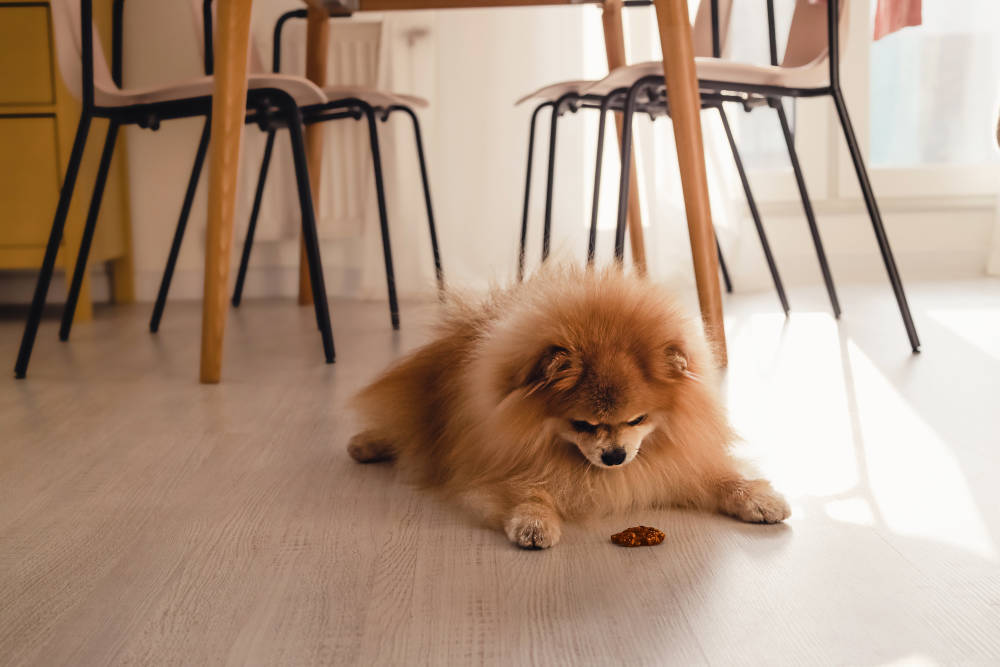Step by Step Dog Training Guide for “Leave It” (1)
This simple dog training skill could save your dog’s life.
To us, the idea of eating food wrappers, horse poop, and other smelly things found on the ground is gross. To your dog, it’s like walking into a room filled with French pastries and desserts — and they’re free. But those scavenged itemsopens in a new tab can also be extraordinarily dangerous.
“Leave it” is an essential cue that asks your dog to leave something alone and is up there among the most useful training cuesopens in a new tab you can teach your dog. Think of it this way: your dog might not stop chasing that deer into traffic on their own, but with an airtight leave-it cue, you can stop them in their tracks and save their life.
littleKin™ is Kinship’s home just for puppy and kitten parents. Bop over to check out expert advice, new pet tools, and special deals—all curated for your newest family member.
opens in a new tabSo whether it’s another dog, that slice of pizza on the edge of the counter, a squirrel, the person uninterested in your dog’s attention, or the cat’s poop, anything can be protected from unwanted attention with a well-practiced leave-it. Here’s a short basic dog trainingopens in a new tab exercise you can practice with your dog every day to master this essential skill.
Teach Your Dog “Leave It”
Leave it is easy to teach to dogs and can prevent your dog from eating something that could hurt them. But before you get started, gather up your supplies: A hungry dog and two kinds of treats (a ordinary treat or biscuit and one far more delicious).
1. Show your dog a treat.
Begin with one of the ordinary treats in an open palm. Lower it to where your dog can see it.
2. Close your hand when they attempt to grab it.
When your dog tries to take the treat, close your hand around it. They will likely nudge at the treat. Ignore this behavior. Ignore any behavior attempting to pry the treat out of your hand. What you’re waiting for is even the slightest hesitation in interest.
3. Wait until they stop trying to get it and reward.
The moment your dog shows even a fleeting second of hesitation in trying to wrestle that treat from your hand, you bring one of the better treats out in your other open palm. The dog gets this treat as a reward for that moment’s hesitation.
4. Next, wait longer before rewarding.
In repeating this dog training drill over the course of days or weeks, you are building up your dog’s skills by waiting for incrementally longer hesitations until it becomes clear they are beginning to understand. The goal is for your dog to show more restraint than they did the first time they were shown the treat.
5. Add in the verbal cue and repeat the practice.
When your dog begins to show more restraint, you can begin to integrate the verbal cue, saying “leave it” when the dog is moving away from the first treat. If they listen the first time, they get the more delicious treat. If they don’t, the fist closes, you wait, and you try again together.
Moving to the Next Level
As your dog’s skill progresses and they achieve a rock-solid “leave it” with treats in your palm, you can work on more advanced training. You can try this exercise but put the treat on the table or floor. Remember, your dog should get rewarded with the more delicious treat and not the one you are asking them to leave. When you are both up for another challenge, head outside and repeat these steps with treats or other temptations on the floor and, again, reward with a more delicious treat.
As with any dog training, don’t force the dog. Work slowly within the dog’s physical and emotional comfort zone to avoid falls. Training should be fun, and your dog will learn better if they’re happy and not frustrated. With a bit of time and patience, your dog can learn this life-saving cue.

